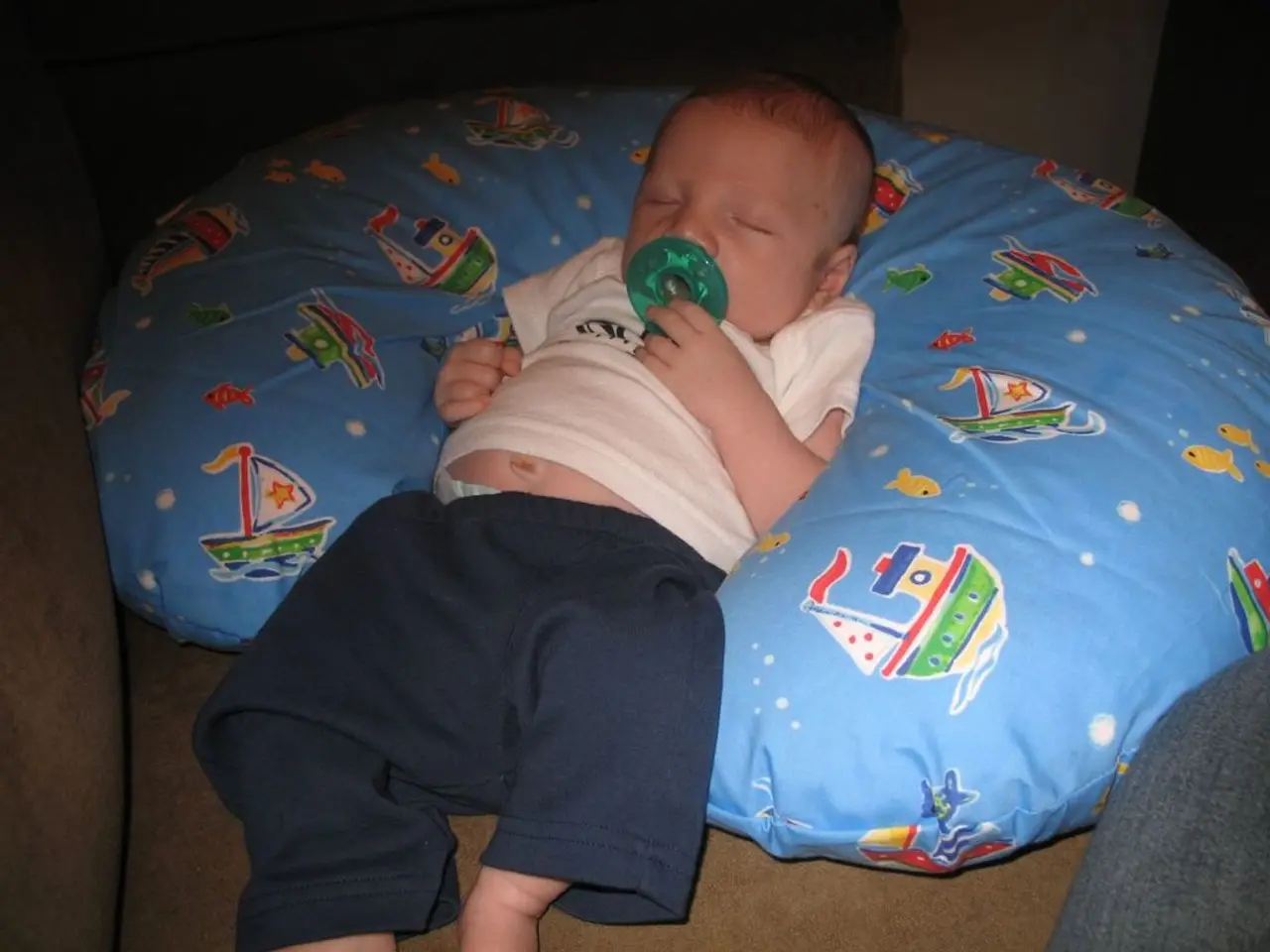Child Bronchitis: Symptoms, Triggers, Remedies, and Further Details
In the world of children's health, understanding how to manage common ailments like bronchitis is crucial. This article outlines some home remedies that can help alleviate the symptoms of bronchitis in children, making their recovery more comfortable.
Bronchitis in children is often characterised by symptoms such as a persistent cough, chest congestion, a low-grade fever, tiredness, and a whistling or wheezing sound when breathing.
When it comes to treating acute bronchitis in children, some complementary and alternative therapies can be effective. Common home remedies focus on easing cough, loosening mucus, reducing inflammation, and making breathing more comfortable.
Rest and Hydration
Ensuring your child gets plenty of rest and drinks sufficient fluids is vital. Rest helps the body recover, while staying hydrated aids in thinning mucus, supporting the immune system during recovery.
Humidifiers and Steam Inhalation
Using a humidifier or allowing the child to inhale steam vapor can loosen chest congestion and soothe irritated airways. However, care should be taken to avoid hot water exposure to prevent burns.
Honey and Lemon
A warm drink with honey and lemon soothes sore throat irritation and reduces coughing by coating the throat. Lemon also provides vitamin C to support immunity. Honey is suitable for children over one year old.
Herbal Teas
Certain herbal teas such as echinacea, butcher's-broom, peppermint, and licorice root may provide anti-inflammatory, expectorant, and soothing effects, helping to reduce coughing and mucus. However, some herbs have age or health contraindications and should be used cautiously.
Avoiding Cough Medicines for Very Young Children
Children younger than 4 years are generally advised against using over-the-counter cough medicines; symptom relief is preferred via natural methods.
Warm Ginger/Turmeric Tea
Ginger and turmeric have anti-inflammatory properties; a warm tea made with these ingredients, possibly sweetened with honey, can ease coughing and soothe the throat.
Over-the-counter Pain Relievers
For fever or discomfort, acetaminophen or ibuprofen can be used as guided by a physician.
It's essential to use these home remedies cautiously and consult a pediatrician if symptoms worsen, persist beyond about 10 days, or if the child has a high fever or difficulty breathing.
Preventing bronchitis in children involves ensuring they receive a flu vaccination, avoiding contact with sick individuals, practicing good hygiene, and keeping them away from airborne irritants such as cigarette smoke.
If you suspect your child has bronchitis, it's important to contact a doctor or pharmacist before giving any medication. Bronchitis symptoms typically last 7-14 days in children, though in some cases they may last 3-4 weeks. A doctor or pharmacist can advise on suitable over-the-counter medications, depending on the age of the child.
In rare cases, a child may experience complications from acute bronchitis, including secondary pneumonia and respiratory difficulties. If you think your child may have pneumonia, seek immediate medical advice.
Home remedies that may help children to recover from bronchitis include clearing mucus using a rubber suction bulb, using honey to relieve coughs in children ages 1 and older, and sucking on lozenges for children over the age of 4 years. However, it's important to supervise children due to choking risks.
In conclusion, while these remedies aim to alleviate bronchitis symptoms in children naturally and safely at home, they do not replace professional medical care when needed. It's best to contact a doctor for advice as soon as there are concerns about the symptoms of bronchitis or related complications.
- A persistent cough, chest congestion, low-grade fever, tiredness, and a whistling or wheezing sound when breathing are common symptoms of bronchitis in children.
- Rest and hydration are vital for the recovery of children with bronchitis, as rest helps the body recover and staying hydrated aids in thinning mucus.
- Using a humidifier or allowing a child to inhale steam vapor can loosen chest congestion and soothe irritated airways in children with bronchitis, but care should be taken to avoid hot water exposure to prevent burns.
- A warm drink with honey and lemon soothes sore throat irritation and reduces coughing in children with bronchitis; honey is suitable for children over one year old.
- Certain herbal teas such as echinacea, butcher's-broom, peppermint, and licorice root may provide anti-inflammatory, expectorant, and soothing effects in children with bronchitis, but some herbs have age or health contraindications.
- Children younger than 4 years are generally advised against using over-the-counter cough medicines, and symptom relief is preferred via natural methods.
- Ginger and turmeric have anti-inflammatory properties, and a warm tea made with these ingredients, possibly sweetened with honey, can ease coughing and soothe the throat in children with bronchitis.
- For fever or discomfort, acetaminophen or ibuprofen can be used as guided by a physician in children with bronchitis.
- Home remedies that may help children to recover from bronchitis include clearing mucus using a rubber suction bulb, using honey to relieve coughs in children ages 1 and older, and sucking on lozenges for children over the age of 4 years, but it's important to supervise children due to choking risks.
- If symptoms worsen, persist beyond about 10 days, or if the child has a high fever or difficulty breathing, it's essential to consult a pediatrician.
- Preventing bronchitis in children involves ensuring they receive a flu vaccination, avoiding contact with sick individuals, practicing good hygiene, and keeping them away from airborne irritants such as cigarette smoke.
- If you suspect your child has bronchitis, it's important to contact a doctor or pharmacist before giving any medication.
- In rare cases, a child may experience complications from acute bronchitis, including secondary pneumonia and respiratory difficulties; if you think your child may have pneumonia, seek immediate medical advice.
- While these remedies aim to alleviate bronchitis symptoms in children naturally and safely at home, they do not replace professional medical care when needed, and it's best to contact a doctor for advice as soon as there are concerns about the symptoms of bronchitis or related complications.




